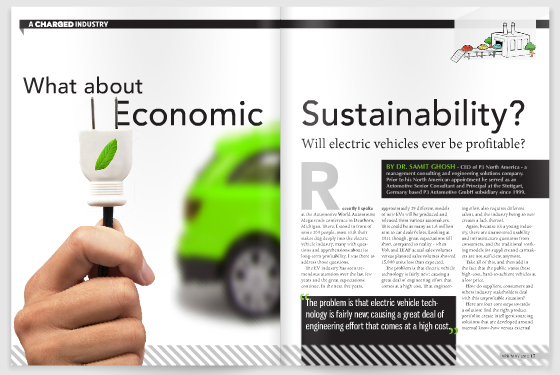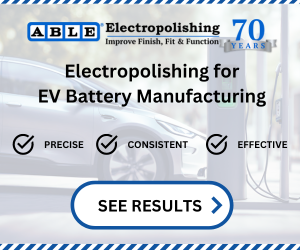The problem is that electric vehicle technology is fairly new; causing a great deal of engineering effort that comes at a high cost.
Recently I spoke at the Automotive World Automotive Megatrends conference in Dearborn, Michigan. There, I stood in front of some 200 people, most with their stakes dug deeply into the electric vehicle industry, many with questions and apprehensions about its long-term profitability. I was there to address those questions.
The EV industry has seen tremendous attention over the last few years and the great expectations continue. In the next five years, approximately 29 different models of new EVs will be produced and released from various automakers. This could be as many as 1.6 million sent to car dealer’s lots. Looking at 2011 though, great expectations fell short compared to reality – when Volt and LEAF actual sales volumes versus planned sales volumes showed 15,000 units less than expected.
The problem is that electric vehicle technology is fairly new; causing a great deal of engineering effort that comes at a high cost. That engineering effort also requires different talent, and the industry being so new creates a lack thereof.
Again, because it’s a young industry, there are unanswered usability and infrastructure questions from consumers, and the traditional working models for suppliers and carmakers are not sufficient anymore.
Take all of this, and then add in the fact that the public wants these high-cost, hard-to-achieve vehicles at a low price.
How do suppliers, consumers and others industry stakeholders deal with this unprofitable situation?
Here are four core steps towards a solution: find the right product portfolio; create intelligent sourcing solutions that are developed around internal know-how versus external development; create partnerships and consolidate to keep costs low; and secure the right talent pool to develop electrified products.
The Right Portfolio
Diversity in product portfolios is driven by the high variety of EV powertrain architectures. This raises costs. In the future, automakers and suppliers need to find platform and commonality approaches between architectures to drive down costs.
Intelligent commonality solutions focus on a layered approach. Let’s take an electric motor for an example. The commonality would come from an identical core design resulting in a constant cross section for the rotor and stator and the power variations would come from varying the length of the motor. There also may be slight differences found in packaging and mounting, but overall, the core is always the same, driving down costs.
Sourcing
Strategic sourcing solutions need to be made by the current players in the EV industry in order to prepare for a sustainable future. Over the mid to long-term horizon, several trends are important to understand.
First of all, a fundamental principle in automotive development is that you can only outsource development successfully if you completely understand what you want.
Equally important is the capability to validate that you received what you specified. Since the technology around electrification is so new many players on the OEM side are heavily relying on suppliers to help them understand their technology solutions.
This trend will change soon, and more and more electric vehicle component development work and manufacturing work being pulled in house. This way, OEMs can come to understand the entire system. This is already happening with several components like E-motors.
In the long term this trend will change again and OEMs will turn to suppliers to take over electrified-vehicle component development, now with the existing knowledge of how to develop and integrate these components.
Ideally, OEMs should keep technology differentiators, such as system integration, controls software and the operating strategy of their electrified propulsion offering in house. These are things that set them apart from other automakers. They can then outsource just commodities, things that are not perceived by the customer during the normal use of the vehicle.
Partnerships
Why partner? Partnerships optimize product portfolios, allow OEMs to build up knowledge and share resources and other efficiencies. Choosing a partner is similar to choosing a mate for marriage – it is best if you choose correctly the first time.
Many suppliers offer what OEMs need, but that doesn’t mean they are all a right fit for the job. The partnership structure is also imperative; will the partnership be long lasting, short-term, or a potential merge? Partnerships that are entered into with all of this in mind work well for everyone.
Talent Pool
Last but not least, the backbone of any company is talent. The talent pool for EVs is small, and more electrical engineers and software/control engineers are needed. Initially partnerships are needed because this talent will be hard to come by. Over time, recruiting is needed to allow your workforce to grow organically.
The right portfolio, sourcing solutions, partnerships, and talent pool can be the answer to many of the challenges the EV industry is facing. These solutions were my answers to those 200 people’s questions. They do not provide every solution needed to be a profitable electric vehicle automaker, but I do believe that most automakers will want to have electrified vehicles in their portfolio to be profitable. Although this is a challenge, it is not an insurmountable one, and I am confident that together we can bring electric vehicles to a parking lot near you.
Dr.SamitGhosh is CEO of P3 North America – amanagementconsultingandengineeringsolutionscompany.PriortohisNorthAmericanappointmentheservedasanAutomotiveSeniorConsultantandPrincipalattheStuttgart,GermanybasedP3AutomotiveGmbHsubsidiarysince1999.
Issue: APR/MAY 2012




















































